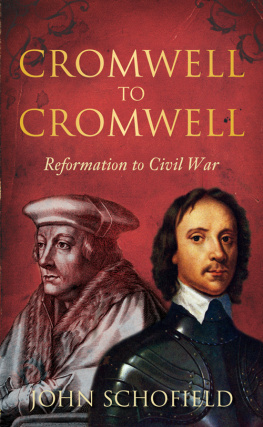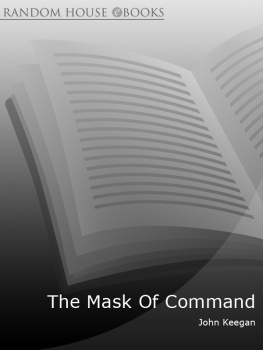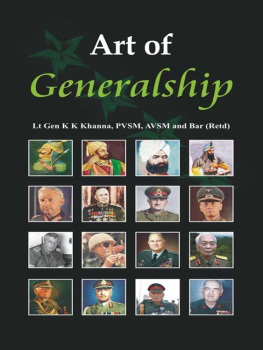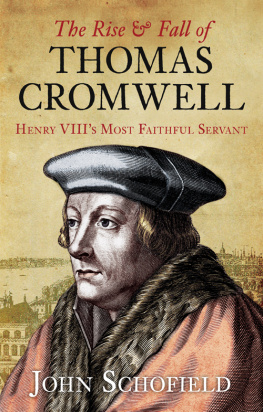2006 The University of North Carolina Press
All rights reserved
Manufactured in the United States of America
Designed by Heidi Perov
Set in Bulmer and Engraver
by Keystone Typesetting, Inc.
Frontispiece: Painting of John M. Schofield by John White Alexander, 1914, oil on canvas. Courtesy West Point Museum Art Collection, United States Military Academy.
The paper in this book meets the guidelines for permanence and durability of the Committee on Production Guidelines for Book Longevity of the Council on Library Resources.
Library of Congress Cataloging-in-Publication Data Connelly, Donald B. John M. Schofield and the politics of generalship / Donald B. Connelly.
p. cm.(Civil War America)
Includes bibliographical references and index.
ISBN -13: 978-0-8078-3007-9 (cloth : alk. paper)
ISBN -10: 0-8078-3007-0 (cloth : alk. paper)
1. Schofield, John McAllister, 18311906. 2. GeneralsUnited StatesBiography. 3. United States. ArmyBiography. 4. United StatesHistoryCivil War, 18611865Campaigns. 5. United States. ArmyHistory19th century. 6. Civil-military relationsUnited StatesHistory19th century. I. Title. II. Series.
E 467.1. S 35 C 66 2006
355.0092dc22 2005031388
10 09 08 07 06 5 4 3 2 1
For my wife, Lynne
Preface
I have written this biography of Lieutenant General John M. Schofield with three different, but occasionally overlapping, groups of readers in mind. For the avid students of the Civil War, I hope to provide a slightly different perspective on the war than combat and battlefield command. For the scholars of civil-military relations, I hope to portray the complexity of the American experience in both war and peace. Finally, I hope current or former soldiers will appreciate the roots of their profession and recognize the dilemmas faced by an earlier generation.
In examining John Schofields Civil War experience, I have placed special emphasis on the role of politics in the formulation and execution of military policy. I have endeavored to demonstrate that there is no easy dividing line. Political disputes about slavery or the use of African American soldiers had enormous military implications. Similarly, military efforts to suppress guerrillas, seize or destroy enemy property, and seek battle or resort to maneuver had enormous political implications. The relationship between political and military policies was even more dynamic as contending political factions attempted to promote their ideas and adherents in both the military and civil spheres.
This study also focuses on the role of military government in American history. During the Civil War and Reconstruction, military governments displaced civil authorities in numerous states. In the early days of the Civil War, Schofield helped overthrow the legal, but secessionist, governor of Missouri. As departmental commander, Schofield supervised a nearly parallel government, with its own courts and the ability to levy fines and taxes. As a military governor in Reconstruction Virginia, General Schofield replaced civilian officials, supervised elections, and drafted constitutions.
The military was also heavily involved in federal intervention in domestic disorders. In the West soldiers in the U.S. Army frequently served as law enforcement officers, while in the East they aided civil authorities in quelling labor violence. Army officers also frequently displaced civilian Indian agents in the supervision of Indian reservations. By the end of the nineteenth century, however, the armys constabulary missions had diminished as the Indian Wars subsided and the state-based National Guard took over the primary task of handling domestic disorder. The U.S. Army turned to new missions.
Throughout the nineteenth century, the U.S. Army undertook the process of professionalization. Before the Civil War, the army had developed a professional ethic of service to the nation and fidelity to the Constitution as its guiding principle. After the war, it emphasized the need for lifelong commitment to professional education and the cultivation of expertise in the art and science of war. Earlier than most of his colleagues, John Schofield recognized that soldiers could never achieve professional autonomy by separating the military from politics. Only by accommodating to politics and the nations intentionally divided institutions could the army attain a limited professional independence.
Another major theme of this study is the changing character and demands of senior command. While Schofield was a field commander in the Atlanta, Nashville, and North Carolina campaigns, the bulk of his command experience was conducted more remotely. As commander in Missouri, he directed rather than led operations against either the Confederate army or guerrillas, much in the same way as he would later orchestrate operations during major domestic disorders, such as the Pullman Strike. Thus, his experiences in planning, directing, and administering military operations further habituated him to think in terms of a modern Chief of Staff rather than a traditional commanding general.
Yet despite these changes, this study affirms the primacy of politics, whether ideological, partisan, institutional, or personal, in the formulation of military policy. Characteristic of the checks and balances of the American political system, military authorities were divided between the states and the federal government, between the executive and legislative branches, and even among the executive departments. Traditionally, conflict over military policy among these institutions produced corresponding divisions within the officer corps. Thus, civil-military conflicts habitually consisted of groups of civil officials and military officers struggling against other civil-military factions over the control of policy.
Finally, I have characterized John Schofield as a political soldier both to emphasize the political environment in which military officers must operate and to differentiate him from the political generals of the Civil War era, such as Frank Blair, John Logan, and Samuel Curtis. Political generals, or generals appointed from civilian life, were a central feature of civil-military relations in the founding of the nation and its early wars. As the need for professional expertise became more important, the senior ranks were filled by lifelong professionals. However, professional soldiers still needed to appreciate the political implications of their actions. This study of the career of John M. Schofield, I hope, will contribute to a greater understanding of the dynamics of American civil-military relations, and especially the shift from political generals to political soldiers.
* * *
One cannot complete such a research project without incurring many debts. First, I need to thank my advisor and friend Dr. Joseph T. Glatthaar, who has patiently guided me in this endeavor from idea to dissertation to book. Next, I must thank the other members of my dissertation committee, Dr. James Kirby Martin, Dr. Frank Holt, and Dr. Richard Murray. Their examples in the classroom and in reviewing and improving my work were invaluable.












